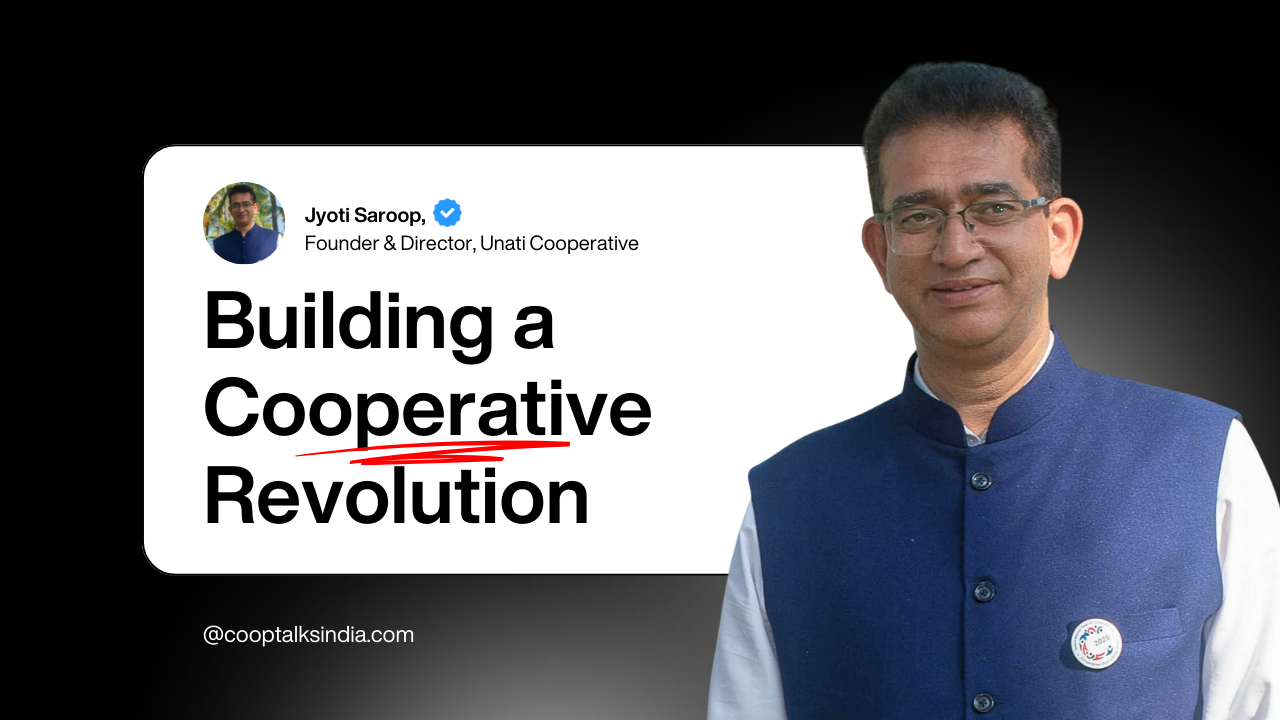
Jyoti Saroop
Founder & Director, Unati Cooperative.
Unati is a success story in cooperatives. Jyoti Saroop, Founder & Director, Unati Cooperative, in a candid conversation with Sanjay Verma, Editor, Coop Talks, shares his experiences and valuable insights based on his long journey. He says that for youth seeking a career, cooperatives offer a unique opportunity to blend entrepreneurship, innovation, and social purpose.
- Can you tell me about your background before you started your journey in cooperatives?
I am a Biotechnologist by education and began my professional career as a scientist. My early years were spent in laboratories and research institutions where I was deeply engaged in scientific research, understanding rural livelihoods, and looking for innovations that could positively impact society. While science gave me a strong foundation of analytical thinking, my heart was always inclined toward finding solutions that could connect directly with farmers and rural communities. This desire ultimately led me to step out of a purely scientific career and dedicate myself to empowering communities through the cooperative model.
- What prompted you to start your entrepreneurial journey in cooperatives?
Around the years 2000–2001, the scenario for young professionals like us was very different. Government jobs were limited, and though the private sector was just opening up, opportunities were scarce. I wanted to create something on my own, so I even tried my hand at farming and processing medicinal plants. But honestly, I failed miserably in those early attempts.
One evening, while sitting in the hostel with friends, we began discussing how to do something meaningful and different. Some suggested forming a company, but all of us came from lower-middle-class families and lacked the capital. Others suggested starting an NGO, but deep inside, we wanted to build not just service but also careers for ourselves. Then came the idea of forming a cooperative—a model that could balance sustainability with livelihood.
When we studied our own Kandi area, the lower Shiwalik belt, and interacted with our community, we realized the irony: people were sitting on rich natural resources yet living in poverty. I still recall the phrase we used that day for ourselves—“Sohne ki Khaan te baithe garib log” (Poor people sitting on a goldmine). That realization was the turning point. It was the inspiration to form Unati, a cooperative that could harness local resources, empower our people, and give dignity to livelihoods.
- What were the challenges you faced in Unati? How did you face them?
When we started Unati, the first and biggest challenge was building trust among Community members and convincing them that the cooperative model could genuinely improve their livelihoods. Resources were limited, professionals were reluctant to join, and we had to struggle to set up infrastructure from scratch. In the early years, financial sustainability was a constant hurdle. But perseverance, transparency in operations, and staying true to cooperative principles helped us overcome these challenges. Step by step, local community saw real outcomes in their income and welfare, which strengthened their faith in Unati. Today, the same cooperative that began with uncertainty is seen as an inspiring story of resilience.
- Unati has emerged as a success story in cooperatives. To what extent do you follow cooperative principles and values?
Right from its inception, Unati has been built on the foundation of cooperative principles—voluntary membership, democratic governance, autonomy, and concern for community. We practice transparency in decision-making, ensure that every member has a voice, and prioritize education and training for continuous improvement. Our initiatives—whether in processing rural produce, setting up new ventures like the Drone Academy, or healthcare outreach—are always evaluated from the perspective of community benefit before business gain. This value-driven approach has kept us aligned with the true spirit of cooperatives.
- What have been the major achievements of Unati in recent years? Which one achievement gave you a lot of satisfaction?
In recent years, Unati has taken several innovative steps that make me proud of how far we have come as a cooperative. We have diversified into natural food products that are now trusted across markets, created sustainable rural employment opportunities, and continued our strong focus on medicinal and aromatic plants. One of our landmark initiatives has been the establishment of India’s first cooperative-run Unati Drone Training Academy, which is giving rural youth access to cutting-edge drone technology for agriculture, livelihood, and entrepreneurship.
To strengthen women’s participation, we launched the Unati Behan Sales Model, empowering local women to become sales entrepreneurs of our natural products. With Unati Eco Rahi, we moved a step further into green tourism, opening opportunities for youth and communities to benefit from eco-conscious travel while showcasing our rural resources. We also initiated the Sehkar Samwad YouTube Channel with NFFAC, a first-of-its-kind digital platform to spread awareness, share cooperative stories, and build dialogue about the future of the cooperative movement.
On the collaboration front, Unati has partnered with three national-level federations NCEL, NCOL, and BBSSL, which has enhanced our reach, credibility, and ability to scale cooperative innovations nationwide. One achievement that gave me immense satisfaction was seeing the steady income rise among farmers due to our processing units for amla, aloe vera, and other crops. The smiles on the faces of farmers and their families are worth more than any balance sheet figures. It reaffirmed that when cooperatives prosper, communities prosper.
- Unati has established a Drone Training Academy, the first of its kind in the cooperative sector. What will be its long-term impact?
The Drone Training Academy is not just about technology—it is about empowerment. By training rural youth in advanced drone technology, we are creating employability, enhancing agricultural productivity through precision farming, and introducing modern tools into rural economies. In the long term, this initiative will bridge the rural-urban divide in technology adoption, generate new income streams, and offer youth a reason to stay connected with agriculture and villages rather than migrate for jobs. It is also a step toward making the cooperative movement future-ready in a digital and technological world.
- As Co-Chairperson of PHD Chamber of Commerce Task Force on Cooperatives, what innovative steps would you like to take to strengthen the cooperative movement? What is your vision?
As Co-Chairperson, my vision is very clear—we want to create a strong interface between cooperatives and corporates. For corporates, social responsibility is often restricted to CSR projects. But I believe they can create a much greater, sustainable impact by connecting with cooperatives. Cooperatives are rooted in the soil, in the struggles and aspirations of farmers and rural communities. When corporate expertise, capital, and global reach meet the grassroots strength of cooperatives, a powerful socio-economic model emerges.
Farmers have their set of challenges, corporates have their own; but when we bring them together on a cooperative-corporate platform, many of these problems can be solved—especially in the fields of agriculture, processing, and services. Through this Task Force, our endeavor is to position cooperatives not as support structures, but as a well-evolved model for inclusive development.
We already have shining examples like Amul, IFFCO, and KRIBHCO, which have shown the world the power of moving from farm to factory to fork. Yet, most cooperatives are still confined to farming alone. Our mission is to bridge that gap. We want to empower cooperatives to add value, to process, to market, and to brand—so that ultimately, the small farmer’s produce can reach the consumer’s plate with dignity and fair value.
This is not just about building enterprises; this is about building hope, building opportunities, and building a model of growth where no one is left behind. That is the vision I carry forward through the PHDCCI Task Force on Cooperatives.
- Do you think Bharat Coop Taxi would be a gamechanger for the cooperative sector? Can it compete with Ola and Uber?
Let me share this with you in the form of a story. Imagine a driver who has been working for years with a private taxi aggregator. Every day he puts in long hours, drives tirelessly, and earns just enough to manage his family. But at the end of the day, despite his hard work, he remains only a service provider, not an owner. The company he works with values his work, yes, but its prime objective will always be revenue and profit—not the long-term welfare of the driver or his family.
Now imagine this same driver as part of Bharat Coop Taxi. Here, he is not just a driver but also an owner of the organization. Every ride he takes, every hour he spends on the road contributes not just to his daily income but also to building an asset he co-owns. This transforms his identity—no longer a gig worker waiting for incentives, but a proud cooperative member shaping the future of his community. This is the hope Bharat Coop Taxi brings to more than 50 lakh drivers across India.
Private companies like Ola and Uber have indeed done remarkable work in transforming the taxi ecosystem, but Bharat Coop Taxi carries a deeper purpose: socio-economic development, dignity, and empowerment. It is not just a service; it is a livelihood revolution.
I must here appreciate the tireless work of Col. Himanshu from NCDC who studied the model in detail and, under the guidance of the Ministry. His commitment has been pivotal in shaping this new cooperative framework. Above all, this initiative draws strength and direction from the visionary leadership of our Hon’ble Minister of Cooperation, Shri Amit Shah ji. His dream is to see cooperatives become not just economic models but social movements that uplift millions—and Bharat Coop Taxi is a shining example of that vision taking shape.
With the right mix of technology, governance, and cooperative spirit, Bharat Coop Taxi is not only capable of competing with Ola and Uber but also of surpassing them—because while others chase profit, Bharat Coop Taxi builds prosperity. It represents the cooperative ethos in its purest form: service with ownership, dignity with livelihood, and growth with community.
- Briefly, what is your vision for Unati in the future?
The vision for Unati is clear and ambitious for 2035. We aim to create livelihoods for 9 crore women through initiatives like the Unati Behan Micro Factory—empowering women from kitchen-based enterprises to meaningful economic contributors. Our mission is to build a complete farm to factory to fork model, ensuring that every step from production to processing to delivery is captured within the cooperative framework, allowing members to gain fair value.
We proudly recognize 2025 as the International Year of Cooperatives, marking the beginning of a decade dedicated to the cooperative movement. This decade belongs to cooperatives as vital engines of sustainable development aligned with the United Nations Sustainable Development Goals (SDGs). Unati envisions cooperatives as a force for social inclusion, economic empowerment, health and nutrition, renewable energy, and digital skilling, especially focused on rural and tribal communities.
Our cooperative model is deeply rooted in Indian culture and values, guided by the spirit of Vasudhaiva Kutumbakam—the world as one family. We aspire to develop a transparent, sustainable supply chain that benefits producers, respects workers’ dignity, and delivers quality products to consumers. Through harnessing science, technology, and traditional knowledge, Unati will lead the cooperative movement into a future where economic prosperity and social welfare go hand in hand, making Bharat a global model for cooperative success and rural transformation.
- Based on your experience, why should youth be interested in a career in cooperatives? What inspiring message do you have for the youngsters who want to take up a career in cooperatives?
Cooperatives are far more than just businesses; they are powerful movements of social transformation. When I started Unati, it was a humble journey focused on empowering farmers and rural communities. Over the years, Unati has grown into a diverse ecosystem encompassing natural products, digital skilling, health and nutrition, Ecotourism, and women’s empowerment—showing how cooperatives can adapt, innovate, and create meaningful impact across sectors.
For youth seeking a career, cooperatives offer a unique opportunity to blend entrepreneurship, innovation, and social purpose. Here, you don’t just build a livelihood for yourself—you build livelihoods for entire communities. You become part of a collective strength that uplifts farmers, women, and rural youth, while shaping sustainable futures.
My message to young changemakers is simple yet profound: If you aspire to create a meaningful career where financial success aligns with purpose and social welfare, then cooperatives are your platform. Be bold enough to innovate, embrace technology, and believe in the power of collective action. This is where real, lasting change is created—transforming not just your life, but the lives of millions.
Join the cooperative movement and be the architects of a future India where growth is inclusive, sustainable, and driven by the power of community.







3 Responses
Excellent
उन्नति सहकारी सभा द्वारा बहुत सारे लोगों को रोजगार दिया गया है खासकर महिलाओं को!आगे भी रोजगार के अवसर आ रहे हैं अगर यह सब कुछ सही तरीके से लागू हो जाए तो यह हो सकता है कि किसी भी कोऑपरेटिव सोसाइटी का उन्नति जैसी सोसाइटी बनना एक चैलेंज हो जाए /
क्योंकि उन्नति में करम है, भक्ति है, शक्ति है और जो नहीं है, उसे भी परमेश्वर जल्दी ही पूरा करेंगे जनसाधारण के भले की भावना से चली इस समिति को साधुवाद!!
Unnati Corporate is a good example, which has worked for the development of the people of Kandi area, especially women, this is really praiseworthy. This is all the result of Mr. Jyoti’s forward thinking and hard work.